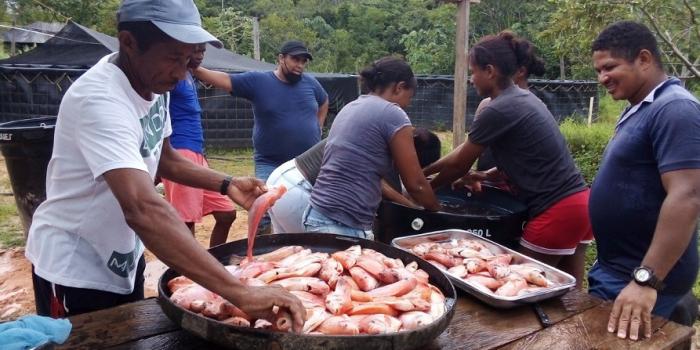
Afro communities reap progress with collective reparation plan
Three community councils of El Bagre, in Antioquia, overcome the armed conflict with productive projects, recovery of traditions and endowments.

With productive projects and the recovery of their traditions and self-government, three Afro-descendant communities in El Bagre (Antioquia) continue to rebuild their ways of life with a plan of collective reparation after resisting the armed conflict.
Villagrande community council residents celebrate a new fish harvest this week, the second in the past two months to improve their livelihood and income generation.
"So far we have harvested 219 kilos, in the first 50 kilos and now more, and that is why the community took it with joy and satisfaction after having overcome many challenges to make this a participatory and sustainable project over time", says Oiden Julio Vergara, representative of Villagrande council.
He also explains that "we agreed on a methodology so that in the end make a liquidation of sales and, very equitably, distribute this resource as added value among families".
The fish farming production unit is the result of part of the 900 million pesos invested as part of the 22 reparation measures agreed by the entity with the black communities of Villagrande, La Esperanza, Chaparrosa, corresponding to the collective compensation.
Territory in recovery
The social leader acknowledges that the collective reparation plan that they implement with the Victims Unit "contributes to repairing, mitigating, and compensating the damages caused by the conflict and the reconstruction of social network that had been broken in our communities".
In addition, to continue its implementation, in the coming weeks there will be a cultural and gastronomic festival and mingas of traditional medicine, which aim to recover ancient traditions that had been lost due to the armed conflict.
According to Wilson Córdoba, director of the Victims Unit in Antioquia, "this collective reparation plan recovers the social network, community practices and ancestral knowledge that were once interrupted by the armed conflict, in addition to strengthening Afro-Colombian identity through measures with an ethnic focus”.
The three community councils are located in a remote area of Puerto López district, more than three hours from the urban area of El Bagre, where they now have better living conditions thanks to actions such as the provision of clothing supplies (flat and filleting machines, cutting tables, fabrics, threads) for a women's dressmaking project.
Last year they also received refrigerators, communications equipment and school supplies from the Victims Unit to facilitate community meetings, the exchange of knowledge and self-government actions.
This collective reparation plan received international cooperation from the World Bank, which supported projects in 55 communities in Colombia where 8.000 survivors of the conflict live. Nine of these are located in the Antioquia municipalities of El Bagre, Chigorodó, Apartadó, Cocorná, Turbo and Granada.
(End/JCM/LMY)






